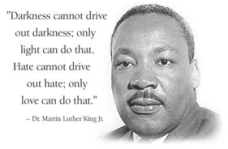I grew up seeing Martin Luther King and the fire hoses and dogs on TV. The civil rights movement was a formative influence for me even if I was a little too young to actively participate. Nonviolence principles as embodied by Martin Luther King and Gandhi, among others, remain a guiding light for me. Is it still relevant today?

Nonviolence, on the surface, seems to be a way to fight against or resist, just to do it without physical violence. After all MLK used nonviolence to fight against racism and bigotry. Ghandi used it to fight against the British colonization of India. Mandela used it to fight against apartheid.
There is a lot more to nonviolence than simply acting without physical violence. Nonviolence may be about fighting injustice yet, at its core, it’s not about fighting against. It’s about love.
What exactly does this mean, in the real world, with the problems we’re facing today? Loving someone we strongly disagree with seems naive or passive or impossible in this time of intensely-held, deep divisions.
Eswaren writes:
“Gandhi gave us the basis for a technology of peace. He gave us tools for resolving conflicts of all kinds, which anyone can learn to use. But it is urgent to understand his message that nonviolence is a way of thinking, a way of life, not a tactic, but a way of putting love to work in resolving problems, healing relationships, and generally raising the quality of our lives.”
Martin Luther King said: “Nonviolence means avoiding not only external physical violence but also internal violence of spirit. You not only refuse to shoot a man, but you refuse to hate him.”
I am far from believing that nonviolence is passive. However, I feel drawn to strengthening an understanding of the underlying principles of nonviolence while also, perhaps, adapting and expanding methods to fit changing conditions.
There are many places to obtain a detailed description of nonviolence. To begin, here are some general guidelines from Michael Nagler at the Metta Center. He writes:
These principles derive from two basic guidelines that we can bear in mind always:
We are not against other people, only what they are doing.
Means are ends in the making; nothing good can finally result from violence.
1. Respect everyone – including yourself. Remember, nobody can degrade you without your permission.
The real success in nonviolence, which violence can never achieve, is to heal relationships.
2. Always include ‘Constructive Programme’. Concrete action is always more powerful than mere symbolism, especially when that concrete action is constructive: setting up schools, cottage industries, cooperative farms, etc.
Be constructive wherever possible, obstructive wherever necessary.
3. Be aware of the long term. Violence sometimes “works,” that is, forces a particular change, but in the long run leads to more misery and disorder.
4. Look for “win/win” solutions that will satisfy the real needs of all parties. In nonviolence we do not seek to be winners, or rise over others; we seek to learn and to make things better for all.
5. Use Power Carefully. The changes brought about by persuasion are lasting: one who is persuaded stays persuaded, while someone who is coerced will be just waiting for the chance for revenge.
6. Claim our Legacy. To know the history of the many nonviolent movements, and be in touch with others involved in similar efforts today, can be very helpful.
These six principles are founded on a belief that all life is an interconnected whole and that when we understand our real needs we are not in competition with anyone. In fact, as Martin Luther King said, “I can never be what I ought to be until you are what you ought to be. And you can never be what you ought to be until I am what I ought to be.”
Pace e Bene: Education, Resources and Action for Nonviolent Change (http://paceebene.org)
Nonviolent Communication: Gandhian Principles for Everyday Living (An article by Miki Kashtan that details the nonviolence principles underlying the practice of Nonviolent Communication developed by Marshal Rosenberg)
Gandhi the Man, The Story of His Transformation (A book by Eknath Easwaran)
